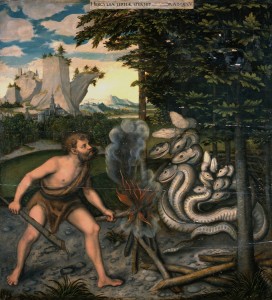Mythic Monday: Mighty Hercules
June 5, 2017
The subject of this week’s Mythic Monday is one of the greatest and most famous heroes of Greek mythology: Hercules. (Called Heracles by the Greeks, he is most commonly known by Hercules, the name used by the Romans.) Hercules was famous for his great strength and courage, but he also demonstrated cleverness and cunning in many of his adventures.

Hercules confronts the many-headed Hydra of Lerna. Credit: Hercules and the Lernaean Hydra (c. 1500), by Lucas Cranach the Elder; Herzog Anton Ulrich Museum (© Alamy Images)
The stories of Hercules, the son of the mortal princess Alcmene and the king of the gods, Zeus, involve many of the other gods, creatures, and heroes of Greek mythology. Hera, the queen of the gods and the wife of Zeus, played a large role in the life of Hercules. Jealous of Alcmene and filled with hatred for Hercules, Hera persecuted him throughout his life.
Failing to kill Hercules when he was still an infant—he strangled the two serpents she sent to do the job—Hera later caused Hercules to have a fit of madness, during which he killed his wife, Megara, and their children. The oracle at Delphi, who was believed to have the power to reveal the will of the gods, told Hercules that he had to serve King Eurystheus of Tiryns for 12 years to purify himself of the murders. Eurystheus commanded Hercules to perform 12 labors.
One of the labors Eurystheus commanded Hercules to performe involved slaying the deadly Hydra of Lerna. This serpent had several heads that grew back as soon as they were cut off. Hercules enlisted the help of his nephew Iolaus to carry out this task. As Hercules cut off the heads of the hydra, Iolaus sealed each neck with fire to prevent the heads from growing back. One of the hydra’s heads was immortal, so Hercules buried it under a rock.
The other labors of Hercules included slaying the fierce lion of Nemea and capturing the huge boar of Erymanthus and the golden-horned Arcadian stag. He also obtained the girdle (belt) of Hippolyta, the queen of the Amazons, by defeating her in battle.
As one of the labors, Hercules was commanded to perform the disgusting task of cleaning out the Augean stables. These stables belonged to Augeas, king of Elis, and they had not been cleaned for 30 years! It was bad enough that Eurystheus ordered Hercules to clean out the stables, but he also told Hercules the job had to be done in a single day. Using ingenuity and strength, Hercules managed to accomplish this seemingly impossible task. He made the Alpheus and Peneus rivers flow through the stables and wash away the filth.
As one of his last labors, Hercules stole the Golden Apples of the Hesperides from the Tree of Life. The Hesperides were nymphs who guarded the golden apples that Gaea (Earth) had given to the goddess Hera when Hera married Zeus. A sleepless dragon helped the Hesperides guard the apples. Hercules managed to take the apples with the help of Atlas, a titan who had to support the sky on his shoulders. Atlas went to get the apples, leaving Hercules to hold up the sky. When he returned with the apples, Atlas refused to take back the sky, hoping to force Hercules to support it permanently. But Hercules outwitted Atlas and deceived him into taking up the sky again.
For his 12th and final labor, Hercules descended into the world of the dead. There he captured the three-headed watchdog Cerberus and brought him back to the upper world.
Many other stories describe the adventures of Hercules. In one of them, Hercules accompanied Jason and the Argonauts on part of their voyage in search of the Golden Fleece, the golden wool of a flying ram.
Hercules also released Prometheus from the punishment to which Zeus had condemned him. Because Prometheus stole fire from the gods and gave it to human beings, Zeus punished him by ordering him bound to a remote mountain peak. An eagle came to devour Prometheus’ liver every day, and the liver grew back each night. But Hercules killed the eagle and set Prometheus free, proving once again that it was far better to have Hercules as a friend rather than as a foe.


